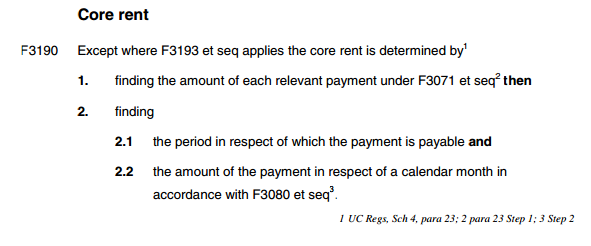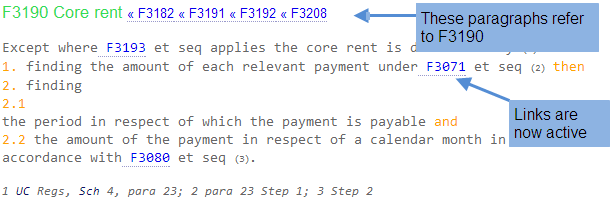Update September 2014
In June 2014 I examined a sample of the material on benefits and tax credits published on .GOV.UK by the government digital service (GDS). I identified a number of factual errors and made several suggestions for improvement. I reported the errors to the GDS, who made some corrections fairly quickly and promised to look at the rest. Three months later, I thought I’d see how they got on.
The good news is that many factual corrections have been made (noted below). A few errors remain, and there are several passages which could stand improvement. Unfortunately the quality of material on benefits remains disappointing – glancing at GDS content on some of the benefits I didn’t cover in June (eg carer’s allowance, housing benefit, ESA) shows that serious errors persist.
Publishing is one of the four strands of the UK Cabinet Office’s Good Law project. When we look at government publishing, we shouldn’t confine ourselves to how government publishes the text of the law itself, we should also examine the material which government uses to communicate the implications of the law to citizens and those who advise them.
Until recently, the main online conduits for such information were Directgov and individual departmental websites. These have been brought together as .GOV.UK, under the auspices of the government digital service (GDS). At least in theory, this should facilitate inter-departmental working and reduce redundancy. It also means that government content can be produced to common standards, both technical and stylistic. To help achieve these goals, the GDS has been given enormous editorial control over non-technical content that appears on .GOV.UK. Content must conform rigidly to a style guide, which places great emphasis on search engine optimization, and, rightly so, on readability.
Unfortunately, there appears to be no equivalent emphasis on fact checking. Having had my attention drawn to a number of errors in material on .GOV.UK, I took a brief look at some of the content relating to social security benefits and tax credits. Comments on a few individual pages follow. None of us – certainly not myself – are infallible, but citizens are entitled to hope for better.
Income support
https://www.gov.uk/income-support/
“At least £56.80 a week.”
This should be £57.35 per week. Corrected September 2014
“You can claim Child Tax Credit if you claim Income Support and have children”
This is true, but it would be more useful to say:
“If you receive income support and have children, you will be entitled to the maximum child tax credit for your household”.
“Personal allowance”
Figures for couples have not been updated to 2014-15 rates. The first three couple figures would still be misleading even if they had been updated – they are the figures that would apply if only one member of the couple was entitled to income support. The £86.65 rate applying to some younger claimant couples is left out altogether. Figures corrected and missing figure inserted September 14. The higher rates for young claimant couples have also been incorporated
“Premiums”
“You can get between £15.55 and £122.20 extra depending on your circumstances -“
The author appears to have glanced at a table of premiums and plucked out the highest and lowest figures. No-one claiming income support will just qualify for the enhanced disability premium at £15.55 – they will also qualify for a disability premium. Similarly, no couple on income support will just qualify for 2x severe disability premiums = £122.20: they will qualify for at least one additional premium.
Corrected September 14
“eg if you’re a pensioner, disabled or a lone parent with a disabled child.”
If you’re a pensioner you can’t claim income support. You might qualify for a pensioner premium if you have a partner who is a pensioner, though in that case your partner would generally claim pension credit instead. Lone parents with disabled children may indeed qualify for additional premiums, but only if they’ve been claiming for many years and haven’t claimed child tax credit or they qualify for a carer premium. It would be better to mention carers in general. Errors corrected and suggestions incorporated September 2014
Income Support Disability Premium
https://www.gov.uk/browse/benefits/jobseekers-allowance
“Disability premiums (Income Support) A disability premium is extra money if you’re under 60 with health problems that stop you from working – what > you get, eligibility, apply”
1) You don’t have to be under 60 to be awarded disability premiums. To be awarded the disability premium or the enhanced disability premium you (as well as your partner if you have one) have to be under pension credit age. There are no age limits specific to the severe disability premium.
2) You don’t need to have health problems that stop you from working in order to be awarded a disability premium as part of income support. And if you did, you would be more likely to be claiming employment and support allowance.
3) Disability premiums don’t just apply to income support: it’s surprising that only income support is covered. Although the disability premium proper is not part of employment and support allowance, both the enhanced disability premium and severe disability premium are. All three disability premiums feature in jobseeker’s allowance and working-age housing benefit. This section has been deleted from .GOV.UK
https://www.gov.uk/disability-premiums-income-support
“2. What you’ll get”
Table suggests that both claimant and partner must qualify for the enhanced disability premium in order to receive the couple rate. Actually, the couple rate is paid regardless of whether one partner or both qualify. The table heading has been amended and is now correct for the enhanced disability premium. Unfortunately it is now wrong for the severe disability premium.
“3. Eligibility”
“Disabled Person’s Tax Credit” was abolished over a decade ago. Substitute “working tax credit with a disability element”. Corrected June 2014
Severe Disability Premium
Needs a line to cover cases where the partner qualifies for the premium but the claimant does not. Amended – note that first bullet list under “Rate if you qualify” should refer to PIP and AFIP
Enhanced disability premium
Need to be under pension credit age – not under 60. Corrected
Jobseeker’s allowance
https://www.gov.uk/jobseekers-allowance
“Jobseeker’s Allowance (JSA) is at least £57.35 a week to help you while you look for work.”
No it isn’t. Jobseeker’s allowance is means-tested (even the contributory allowance is partially means-tested). The minimum amount is £0.10 per week. Uncorrected
“JSA does not affect Child Benefit or child tax credit”
Actually, if you qualify for income-based JSA, you will automatically qualify for the maximum child tax credit applying to your household. Unchanged
Table for income-based JSA rates.
This table omits figures for couples not both aged 18 or over. Still missing
“Also, to get income-based JSA you (and your partner if you have one): must usually work less than 24 hours a week (on average)”…
No. The claimant must usually work less than 16 hours per week. If they have a partner, the partner must usually work less than 24 hours per week. This is true even in joint-claim cases: the one partner can work up to 24 hours. Still wrong
“Self-employed”
“You could get income-based JSA, tax credits or Employment and Support Allowance instead.”
You might, but the latter two are not alternatives to contributory JSA for self-employed people. Child tax credit is paid to parents in and out of work. Working tax credit is paid to people in work (or treated as being in work). Employment and support allowance is paid to people too sick to work. Unchanged
Child tax credit
https://www.gov.uk/child-tax-credit
- “You could get a basic amount and extra (known as ‘elements’) on top of this.”
No. The basic amount is also an element: the family element. The author has probably made a mental analogy with other means-tested-benefits, where premiums may be added on top of a personal allowance. Not so for tax credits. This isn’t just pedantry: if claimants are trying to understand their awards, it’s important to use the right words. Corrected August 2014
A table sets out the elements applying to each individual child in a family. The table gives three rates, noting that the third can be paid in addition to the second. It should also say that the second is paid on top of the first: noting one and not the other implies the opposite. corrected August 14
The phrase ‘Up to’, in the table suggests that the elements are individually tapered (or perhaps paid at a variety of rates). In fact all elements (working and child tax credit) are added together: if assessed income is greater than a threshold figure, this maximum amount of tax credit is reduced by a percentage of the difference. unchanged
Working tax credit.
https://www.gov.uk/working-tax-credit
No mention that you will have to be at least 25 unless you have children or a qualifying disability – this omission is repeated under the heading “Your age” fixed by Sept 2014
- “Basic Amount”
See as per Child Tax Credit But not corrected for WTC
The table suggests that claimants with a severe disability will receive this element on top of the disability element. In fact, an award may include either element or both. It is quite possible for an award to include a severe disability element and not a disability element. *Corrected September 2014

